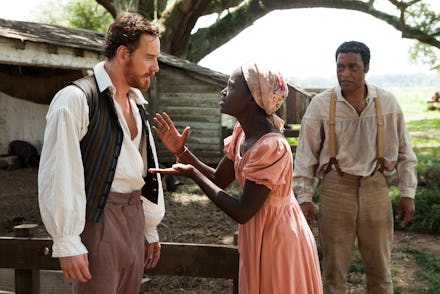Black People Shouldn't Care About the Oscars Because the Oscars Don't Care About Them

Oscar season is back, motherf*ckers, and black America is unhappy.
This was supposedly a banner year for black film. But, with the exception of 12 Years a Slave, "our" movies got the nomination shaft — and I don't mean Richard Roundtree. Fruitvale Station? Snubbed. The Butler? Snubbed. A Madea Christmas? Double-snubbed. The Oscar ballot stayed as white as a snowed-in, bad sweater party at Dick Cheney's house. But why do we care so much?
For starters, on-screen portrayals are thought to influence viewers' ideas about "who is important and whose stories are valuable." Considering #Amurica's troubled racial history, the civil rights implications of this are unavoidable. Black folks have endured untold tidal waves of shit since the first slavers tossed our whip-scarred asses onto American soil, yet centuries later, we're still fighting to control how our stories are told. Hollywood's prominence makes it a central part of this conversation — and we need more films like Fruitvale Station in that conversation.
But let's keep things in perspective. The Academy Awards plays a major role in determining which films get made in the future, since nominations and wins generate large revenue increases for all involved. But somewhere along the way, we've convinced ourselves that the Oscars are a meritocratic recognition of cinematic quality. This is bullshit.
Oscar voting works like any other election, and has many of the same problems. Of the voting pool, 94% are white and 77% are male, according to a 2012 Los Angeles Times report which identified more than 5,100 members (89%) of the Academy of Motion Picture Arts and Sciences. Their median age is 62. To become an Academy member, you must either 1) get nominated for an Oscar, 2) apply for membership and get recommended by two members, or 3) get endorsed by the Academy staff or a branch membership committee.
And membership usually lasts for life, ensuring that the organization functions like an old boys' club from one generation to the next. Diversity is a big problem, and it manifests even in a year when high-quality black films should legitimately be contenders.
But perhaps more telling is how Oscar campaigns work. Gift-giving is prohibited, but when major studios get involved, all bets are off. During Oscar season in 2013, Warner Bros. and Disney spent impressive sums on coffee table books, new iPod shuffles, and hand-signed letters from directors in order to sway Academy voters to endorse their respective films, Argo and Lincoln. Just like in American politics, Oscar votes can be bought. They're often bought along the lines of the Academy's demographics and tastes, too.
Black Americans would do well to remember this. While it's true that an Oscar win would increase the likelihood "our" films continue getting made, our Oscar hang-up causes us to miss a key part of the issue: quality is beside the point. The Oscars are biased towards films that appeal to the exclusive demographic of their voters, often backed by big studios with expensive campaigns behind them. "Snubs" aren't about good movies being overlooked — they're more often about misaligned demographics and cash failing to line the right pockets.
So if viewers really care about Oscar wins, they should shift their arguments away from whether a movie is "good" or "bad." Let's talk about the politics instead — whether it's the blinding whiteness of the Academy or the stacks spent campaigning. That's the conversation we need to be having. And that's when the real progress will begin.